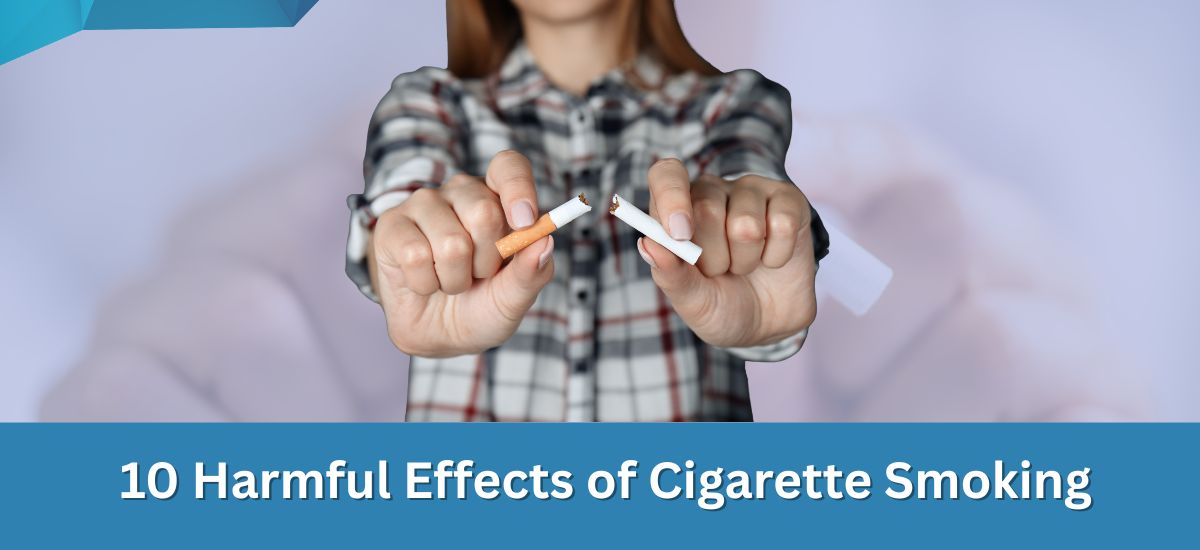- Have any questions?
- 085913 90567
- drgeorgechestdiseases@gmail.com
10 Harmful Effects of Cigarette Smoking

Lung Cancer vs Tuberculosis
October 16, 2025
The Role of Biomarkers in Lung Cancer: From Detection to Personalized Therapy
October 16, 2025Smoking cigarettes remains one of the leading preventable causes of disease and deaths worldwide. In spite of worldwide campaigns to raise awareness, a significant portion of individuals still underestimates the reality of risks.
As a seasoned thoracic surgeon in Mumbai, Dr. George Karimundackal states, “Each cigarette causes damage at a cellular level. The effects are not instantaneous, but the damage over the course of years can lead to issues that are irreversible.”
It is not only necessary for smokers themselves but also second-hand smokers to be aware of the 10 harmful effects of cigarette smoking. Smoking impacts nearly all organs of the human body, and its impact extends far beyond the lungs.
If you are struggling with the harmful effects of cigarette smoking, consult a thoracic surgeon for evaluation and advice. Early medical advice can prevent long-term complications
Contact NowCurious why health experts constantly warn against cigarettes? Let’s understand the 10 harmful effects of cigarette smoking one by one.
What Are 10 Dangers of Smoking?
1. Lung cancer

Smoking is the leading cause of lung cancer, contributing to over 85% of all cases. The toxic chemicals in cigarettes directly damage lung tissue, leading to abnormal cell growth. This can eventually result in malignant tumors that spread throughout the body.
2. Heart disease

Smokers are at a much higher risk of developing heart disease. The chemicals in cigarettes damage blood vessels, raise blood pressure, and increase the likelihood of blood clots, all of which contribute to heart attacks and strokes. Long-term smoking weakens the heart and can lead to chronic heart conditions.
3. Chronic obstructive pulmonary disease (COPD)

COPD is a collection of lung conditions, most commonly emphysema and chronic bronchitis, which are primarily caused by long-term smoking. Smoking damages the airways and lung tissue, leading to breathing difficulties, persistent coughing, and an increased risk of respiratory infections.
4. Stroke

The risks of smoking extend to the brain, where it significantly increases the likelihood of having a stroke. The toxins in cigarettes can cause blood clots and increase the formation of fatty deposits in blood vessels, leading to blocked arteries in the brain, ultimately resulting in a stroke.
5. Oral health problems

Cigarette smoking stains teeth, causes gum disease, and increases the risk of oral cancer. Persistent bad breath and tooth loss are also common among smokers. Gum disease not only affects oral health but also raises the risk of heart problems due to chronic inflammation. Oral cancers caused by smoking often require aggressive treatments like surgery and radiation. A smoke-free mouth is not just about fresh breath—it’s about preserving overall health and well-being.
6. Reduced immune function

Smoking compromises the body’s ability to fight infections. It reduces the production of immune cells, making smokers more vulnerable to infections and illnesses. The long-term suppression of immune function can lead to more severe and frequent illnesses.
7. Increased risk of diabetes

Smokers are at a higher risk of developing Type 2 diabetes. The chemicals in cigarettes cause insulin resistance, making it harder for the body to regulate blood sugar levels. This condition can eventually lead to diabetes, with its own set of severe health complications.
8. Reduced Bone Health

Smoking weakens bones, making them brittle and more prone to fractures. Osteoporosis is more common in long-term smokers, especially in women. Reduced blood supply to bones interferes with the healing process after injury or surgery. Over time, this leads to chronic pain, posture problems, and mobility issues. Protecting bone density is vital for aging well, and quitting smoking plays a major role in preserving skeletal strength.
9. Infertility and pregnancy complications

Smoking can interfere with fertility in both men and women. In women, smoking can damage the fallopian tubes, reducing the chances of conception. In men, smoking reduces sperm count and motility. For pregnant women, smoking can lead to complications such as premature birth, low birth weight, and an increased risk of stillbirth.
10. Premature aging

The effects of smoking on health are visible on the outside too. Smoking accelerates the aging process. It reduces blood flow to the skin, depleting oxygen and nutrients that are vital for healthy skin. This leads to wrinkles, sagging, and an overall dull complexion. Additionally, smoking increases the formation of free radicals that damage the skin’s elasticity.
Struggling to breathe or feeling pain in the chest due to smoking? Seek expert advice and receive timely care. Schedule an appointment today
Contact NowConclusion
The harmful effects of cigarette smoking are extensive and for the most part irreversible. Ranging from heart disease and cancer to impaired immune systems and infertility, the dangers extend well beyond what most individuals realize. The connection between smoking and cancer is arguably the most alarming, but the damage does not stop there—it affects virtually every organ within the body.
Remember, the earlier you quit, the greater the benefit for your health and future. If you have been wondering why quit smoking, it’s all about guarding your body, extending your lifespan, and improving your quality of life.
Quitting is just the start, but doctor's assistance matters. A thoracic specialist can assess the impact of smoking on your lungs and advice you on the road to improved living
Contact NowFAQs
Cigarette smoking causes cancer, lung disease, heart illness, compromised immunity, infertility, and early aging. It damages nearly every organ in the body.
Every puff contains thousands of chemicals, including tar and nicotine. These toxins damage cells, blood vessels, and organs and cause life-threatening long-term diseases.
In males, cigarette smoking reduces sperm count, causes erectile dysfunction, increases the risk of cancer, and raises the risk of heart disease and stroke.

